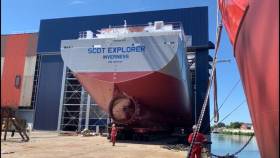Displaying items by tag: Timber Traders
A UK forest-products specialist which has operations including services to Irish Ports have ordered a third newbuild of the same design from a Dutch shipyard, writes Jehan Ashmore.
Scotline Marine Holdings Ltd confirmed the order from Royal Bodewes Shipyard of Hoogezand from where newbuilding (yard no.750) is to be named Scot Ranger. This is the same name used previously following the sale earlier last year of Scot Ranger which had seen this older tonnage discharge cargoes in Wicklow Port.
Scot Ranger follows the 4,800dwt Scot Carrier launched last year and Scot Explorer (pictured above) which is due to be completed in November 2019. The third newbuild has a delivery scheduled for the end of 2020.
According to Scotline although of the same design, Scot Ranger will be certified to ice class 1A, enabling passage within Swedish and Finnish waters. This makes the new addition to the fleet of 14 vessels ideal for the operator's liner services out of the Baltic.
The Romford in Kent based operator primarily runs liner services throughout northern Europe with regular routes between Sweden, Ireland, Denmark, Germany, Norway, the Baltic States and those serving the UK, Netherlands and France.
Also in Kent, the forest-products operater exclusively has terminals and an office in Rochester on the river Medway and another site located at Inverness, Scotland.
























































